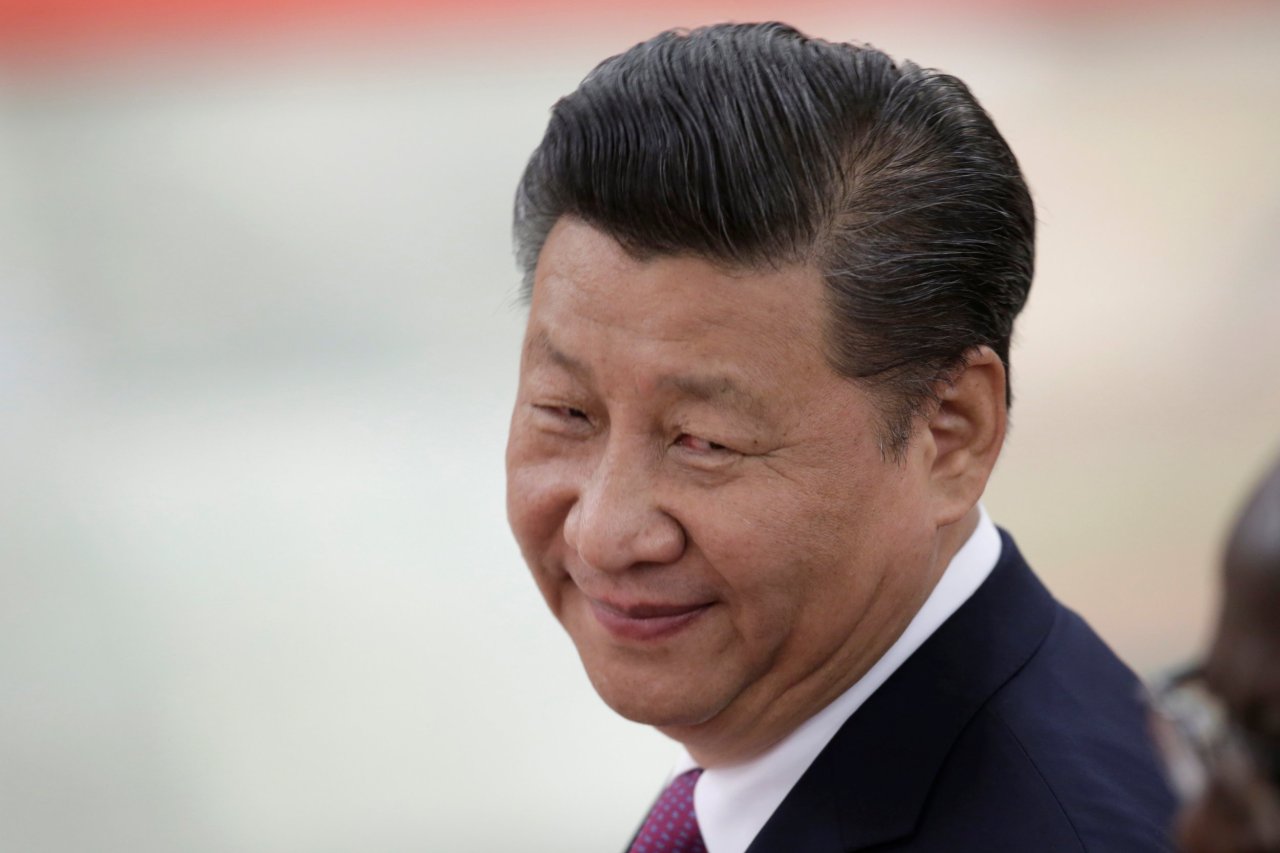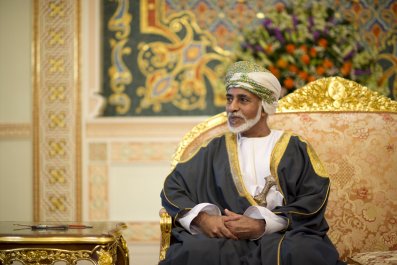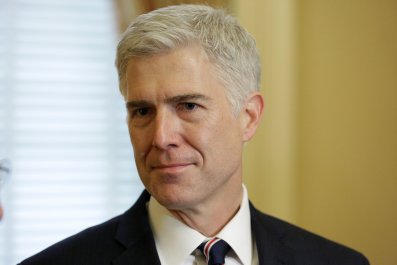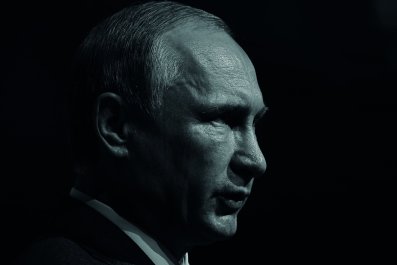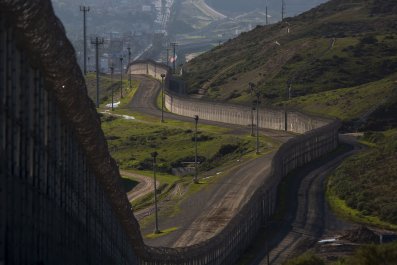It had to be a first in the annals of presidential diplomacy: a commander-in-chief getting so addled by a phone conversation with a counterpart that he barked at the other leader and then slammed down the phone, 25 minutes into what was intended to be a one-hour conversation. Why a first? Because the leader on the line with President Donald Trump was the prime minister of Australia, as rock-ribbed an ally as the United States has. And the subject of the presidential temper tantrum? An obscure agreement for the U.S. to accept 1,250 refugees currently held in camps on the Pacific Islands of Nauru and Manus.
Trump ran as an immigration hawk, and evidently sees this episode—embarrassing one of Washington's key allies—as part of a piece: getting tougher on immigration, by building a wall with Mexico or declining to accept refugees, is one of several campaign promises Trump has already made a stab at fulfilling in a flurry of activity that amounts to government by "stun gun," as one editorialist wrote.
Trump campaigned on the notion that government in Washington was broken—corrupt and ineffective in serving the broad interests of most Americans. He is determined to do things his way, and if that breaks precious china—i.e., the way things have been done to date—he obviously doesn't give a damn.
The consequences of this attitude, however, are also becoming clear. The rollout of the "extreme vetting process" for potential refugees from Islamic conflict zones, which Trump touted during his campaign, has been calamitous. To not even brief the bureaucracy as to what the new policy does and does not entail—as the administration did not—was malpractice.
But set aside his fiats on immigration. Consider, instead, the quieter (for the moment) issue of trade and, more broadly, U.S. relations with China, which brings us to one of Trump's first decisions: the formal abandonment of the Trans Pacific Partnership, a trade deal that involved 12 Asia Pacific nations. What appears absent, at least so far in the earliest days of this administration, is any consideration of second-order consequences; that is, things that flow out of a decision that might not have been uppermost in the president's mind when it was made. Trump reiterated in his inaugural address what he said repeatedly during the campaign: that his administration will be all about "America first." In that context, he sees most if not all trade agreements as not being in America's interest; thus, he abandons TPP, prepares to renegotiate the North American Free Trade Agreement and threatens to pull out of already negotiated free trade agreements with close allies like South Korea. If, in Trump's view, the economics of these deals are one-sided—as, arguably, the South Korea free trade agreement (FTA) is—then America's better off without them.
But that's where second-order effects come in. What Barack Obama said during his otherwise lackluster effort to sell the TPP to Congress bears repeating: A world without a new U.S.-led trade agreement in the Asia-Pacific region means that an increasingly powerful China will step into the void. And thus, on cue, Chinese President Xi Jinping, at the annual conference in Davos, Switzerland, said in a speech, " We will advance the building of the free trade area of the Asia-Pacific and negotiations of the Regional Comprehensive Economic Partnership to form a global network of free trade arrangements. China stands for concluding open, transparent and win-win regional free trade arrangements and opposes forming exclusive groups that are fragmented in nature. China has no intention to boost its trade competitiveness by devaluing the renminbi, still less will it launch a currency war."
The funny thing is, many in the audience apparently believed him, several attendees said, even though operating in China during Xi's reign has gotten harder for multinational companies, not easier.
China's assuming a leadership role in what is still the world's most dynamic region economically is the sort of second-order effect that should have been troubling to the incoming Trump-kins. It drives America's closest allies—Japan and South Korea—to distraction, because all things considered, they'd rather see the U.S. remain the dominant power in the Pacific. Japanese Prime Minister Shinzo Abe made a visit to Trump Tower during the transition to plead his case for TPP and continued American leadership, to no avail. Tokyo and Seoul still view Beijing skeptically. They see China as a country with a huge historical chip on its shoulder and apparently boundless ambitions to rule its region.
Trump has instead unsettled U.S. allies—and not just on TPP. South Korea, for example, was not a party to the agreement, because it already has an FTA with the U.S. But Trump has threatened to terminate that, again because he believes it benefits South Koreans more than Americans. What would be the consequences of walking away from that agreement? Listen to what a senior South Korean government official said this summer: "An FTA is not just a trade pact but an agreement that closely intertwines member countries in about every aspect, including political and diplomatic aspects. An attempt to nullify such an agreement simply because one does not like it anymore is quite literally the same as telling the other party that they will not see each other anymore forever."
This is a big part of the reason Defense Secretary James Mattis, one of two grownups in the room when it comes to Trump's national security team (the other is the homeland security chief, John Kelly), made his first trip in office to Seoul and Tokyo. He knows he has some serious hand holding to do. The South Korean government, he knows, has a vociferously anti-American—and pro-China, pro-North Korea—opposition. The U.S. walking away from this free trade deal would be a gift to that opposition—and to Beijing.
Why in the world would Trump want that? During the transition, after all, his comments about trade, about amending the so-called One China principle regarding Taiwan and remarks by Secretary of State Rex Tillerson during his confirmation about standing up to Chinese expansion in the South China Sea have all made people in the region nervous for the opposite reason: that Trump seems to be pushing for a confrontation with Beijing. And in this case, the possible first-order consequences are obvious: What if Beijing starts lobbing missiles into the Taiwan Strait—as it did during the Clinton administration—to prove that it means business when it says don't change the status quo when it comes to Taipei? Would Trump send in a carrier group, as President Clinton did? Or would he say, "Ah, the hell with it, America first"? That would be an unexpected, second-order consequence that no one in the region wants to see, and the fact is, right now, no one in east Asia knows how Trump would respond.
They're uncertain for a good reason: Given the rhetorical hostility Trump and his team have evinced toward China thus far, it's fair to expect Beijing to test the new administration, in Taiwan or perhaps elsewhere. And given that Trump has named adviser Steve Bannon, a self-described "economic nationalist" with no national security experience, to his National Security Council—while excluding the chairman of the Joint Chiefs and the director of national intelligence from meetings, except those "where issues pertaining to their responsibilities and expertise are to be discussed"—God knows how the new crowd actually would respond to a Chinese provocation.
Second-order effects are sometimes difficult if not impossible to foresee. Think of the U.S. arming Islamic jihadis to rout the Soviet Union in Afghanistan, only to see the World Trade Center towers collapse after an Al-Qaeda attack two decades later. But now, when it comes to trade and China and the U.S. role in Asia, some of the potential effects are already pretty obvious, and yet scarcely seem to have been considered. And that's alarming.



